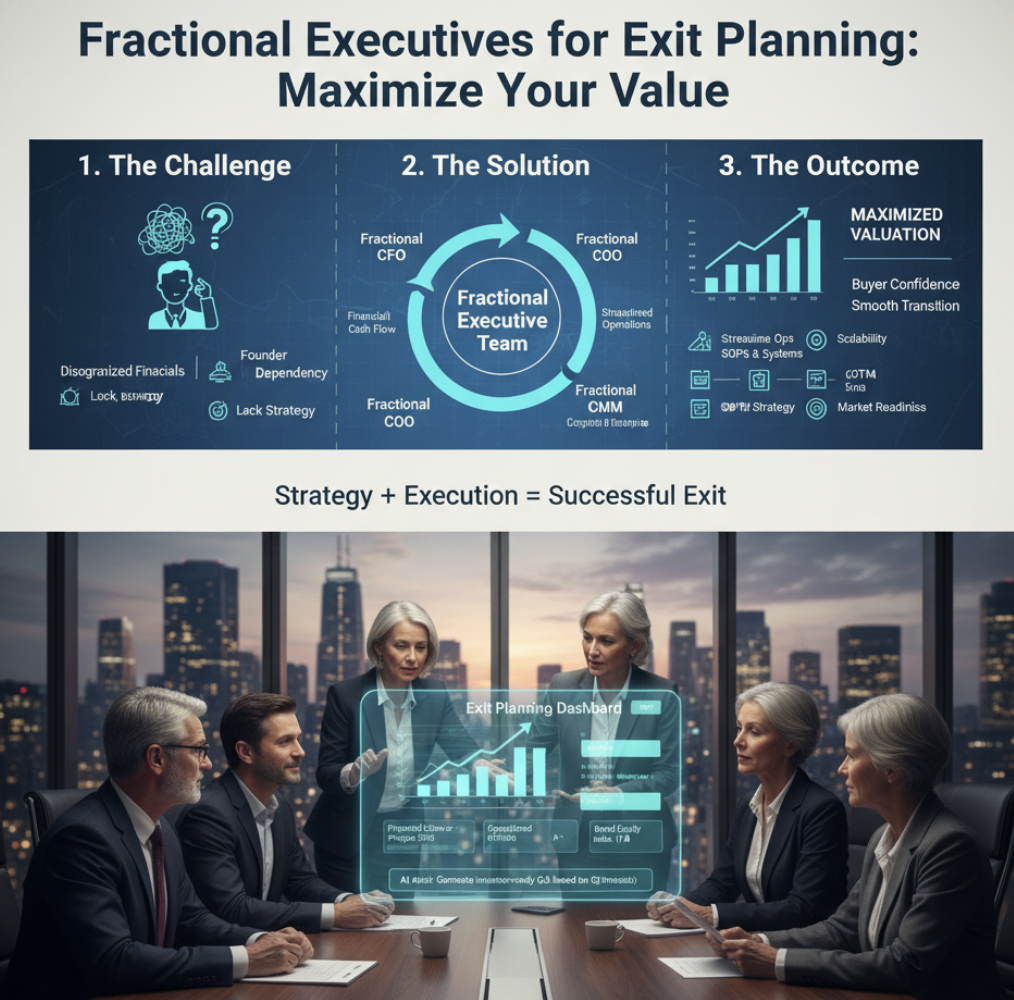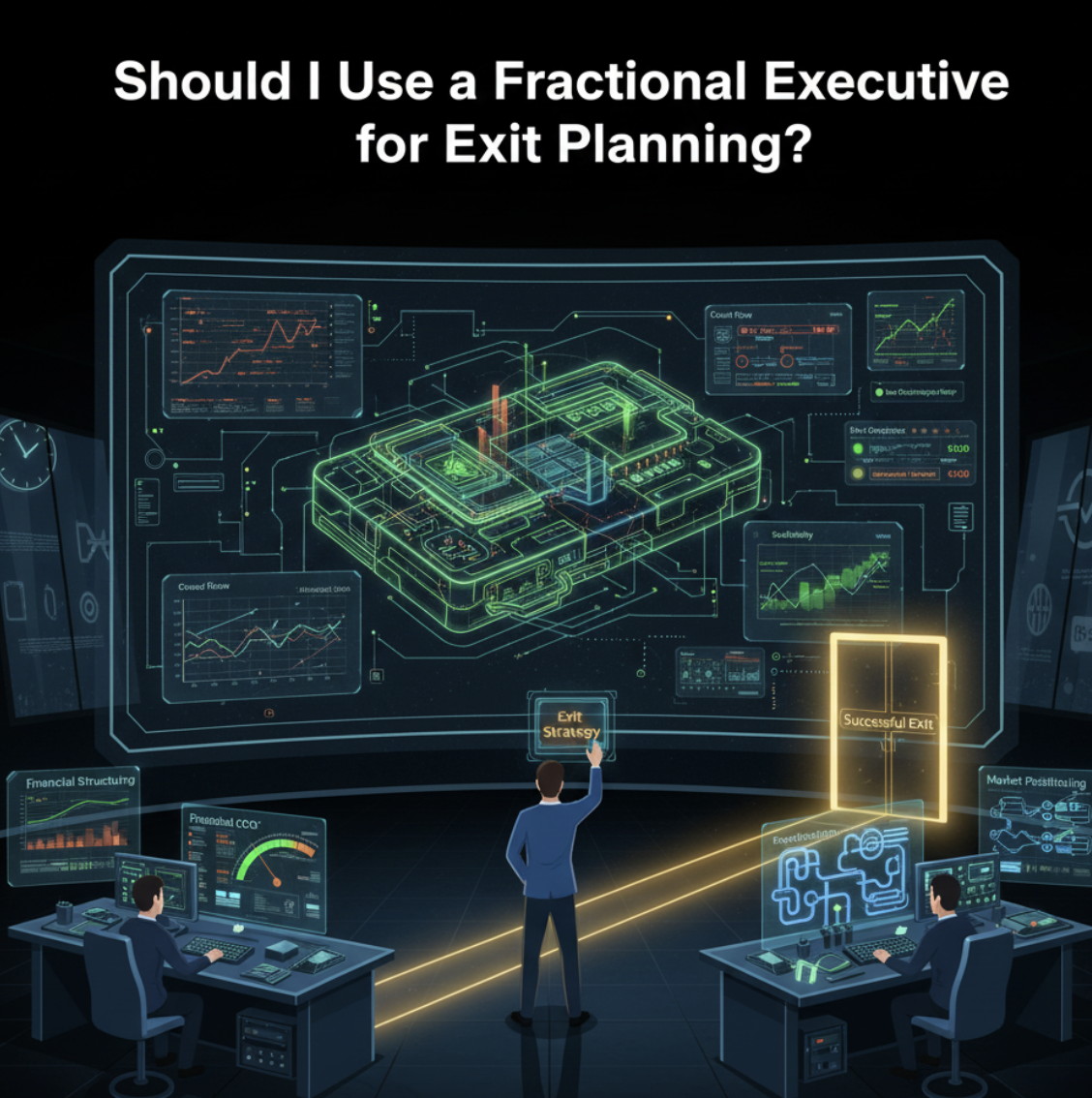Introduction: Exit Planning Challenges for Founders
For many founders, planning an exit is both exciting and overwhelming. Whether you’re preparing for a merger, acquisition, or buyout, the stakes are high. Investors and buyers will scrutinize your financials, operations, and leadership. Yet most startups and SMEs don’t have a full-time C-suite dedicated to preparing for these complex transitions. That’s where a fractional executive for exit planning can step in — providing strategic leadership without the cost of permanent hires.
What Is a Fractional Executive in Exit Planning?
A fractional executive is an experienced C-level leader who works with your business on a part-time, contract, or project basis. For exit planning, fractional executives often include:
- Fractional CFOs – prepare accurate financials, improve cash flow visibility, and manage due diligence.
- Fractional COOs – streamline operations, fix inefficiencies, and make the business more scalable.
- Fractional CMOs – strengthen brand positioning, customer acquisition strategies, and market readiness.
Unlike consultants, fractional executives are hands-on leaders who integrate into your team, ensuring decisions get executed, not just recommended.

Why Fractional Executives Are a Game-Changer for Exit Planning
When planning an exit, three things matter most: credibility, efficiency, and valuation. Fractional executives help you achieve all three.
1. Financial Readiness
- Clean up financial statements for potential buyers.
- Build forward-looking models that demonstrate growth potential.
- Oversee due diligence to avoid red flags.
2. Operational Excellence
- Identify bottlenecks in processes and fix them.
- Document SOPs to ensure business continuity post-exit.
- Build scalable systems that appeal to acquirers.
3. Market Positioning
- Refine messaging to position the company as acquisition-ready.
- Align marketing and sales strategies with growth projections.
- Improve customer retention — a key factor in valuation.
💡 Pro Tip: Use tools like the Due Diligence Checklist to stay organized and avoid last-minute surprises.
Fractional Executive vs. Consultant vs. Advisory Board
| Model | Best For | Limitations |
|---|---|---|
| Fractional Executive | Hands-on leadership, execution, integration | Costs more than advisory boards |
| Consultant | Specific expertise, project deliverables | Not embedded in daily operations |
| Advisory Board | Strategic guidance, external perspective | No operational execution |
For exit planning, a fractional executive strikes the best balance between strategic insight and real-world execution.
Signs You Need a Fractional Executive for Exit Planning
- You’re considering M&A within 12–24 months.
- Financials are disorganized or lack forward-looking clarity.
- Operations rely too heavily on the founder.
- Your company lacks formalized SOPs.
- You need leadership support without committing to a full-time C-suite.
If these resonate, a fractional executive could be the missing piece to maximize your exit.

Leveraging AI to Enhance Exit Planning
Modern exit planning isn’t just about people — it’s about systems. AI-powered workflows can make the process faster and more accurate:
- AI financial modeling tools: Forecast scenarios buyers care about.
- Prompt libraries like this one to structure investor Q&A.
- Checklists like the 90-Day Success Guide to align executives and staff quickly.
Fractional executives often leverage these tools to deliver results faster and at lower cost than traditional full-time hires.
FAQ: Fractional Executive Exit Planning
What’s the difference between a fractional executive and a consultant?
A consultant advises; a fractional executive executes. For exit planning, execution is critical.
How much does a fractional executive cost for exit planning?
Costs vary, but most range from $5K–$20K/month depending on role and involvement — still significantly less than hiring a full-time C-suite.
When should I bring in a fractional executive for exit planning?
Ideally 12–24 months before an intended exit to give time for cleanup, restructuring, and scaling.
Can a fractional executive help in M&A negotiations?
Yes. A fractional CFO or COO often plays a direct role in buyer discussions, ensuring your company is represented professionally.
Is it worth using both a fractional executive and an advisory board?
Yes — the board provides perspective while the fractional executive ensures execution.
Final Thoughts: Is a Fractional Executive Right for Your Exit?
Exit planning is too important to leave to chance. A fractional executive can help you:
- Maximize valuation
- Smooth operations
- Ensure financial clarity
- Build buyer confidence
👉 If you’re preparing for an exit, consider working with NeoGig to connect with vetted fractional executives who know how to guide companies through complex transition.







